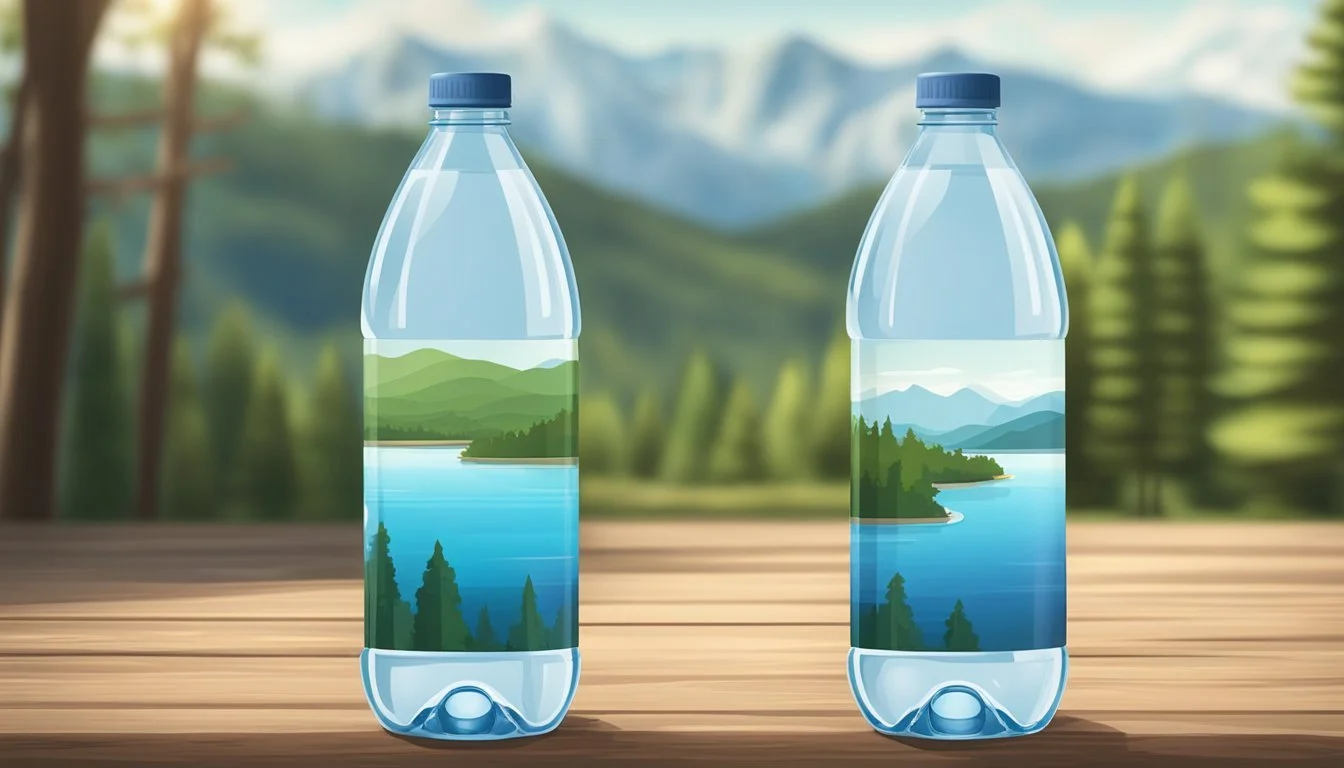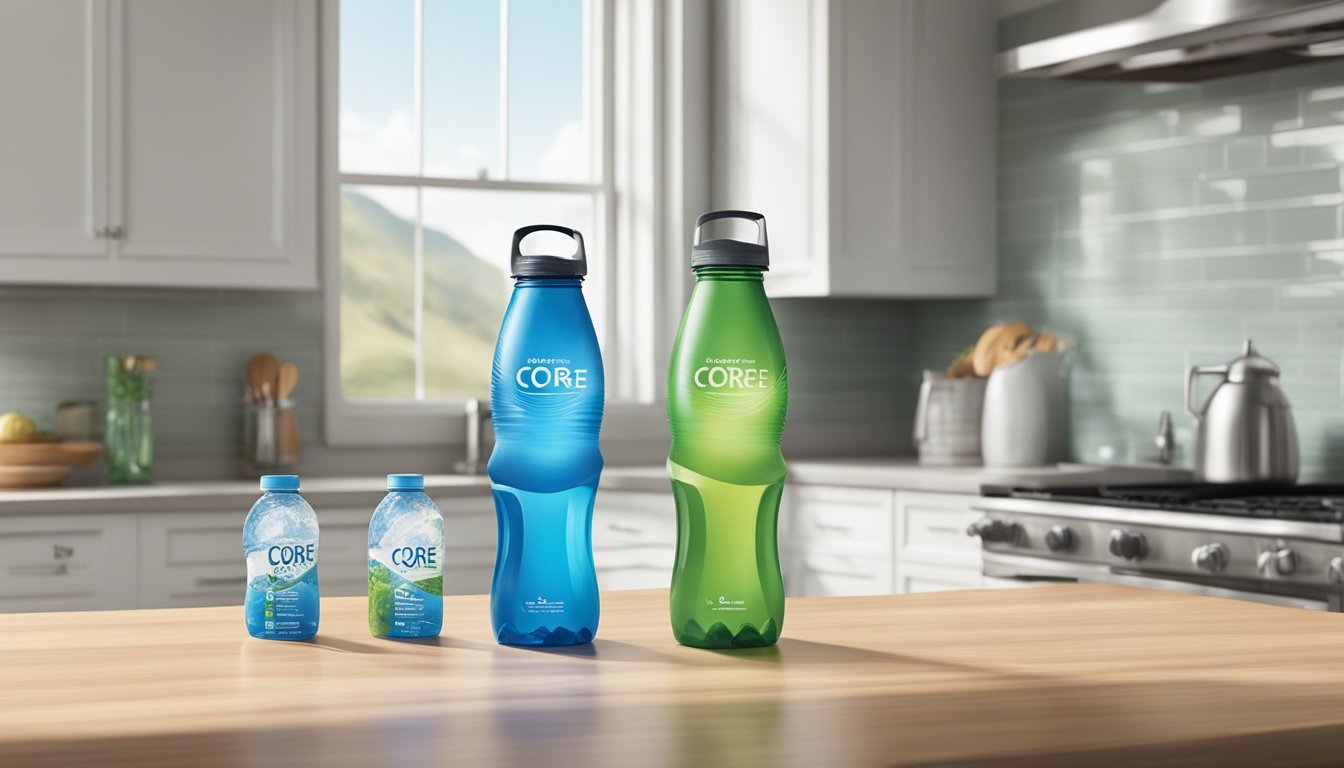Core Hydration vs. Mountain Valley Spring Water
An Unbiased Comparison
Choosing the right bottled water can be a surprisingly nuanced decision for consumers who value both taste and quality in their hydration choices. Core Hydration and Mountain Valley Spring Water are two brands that stand out, each with its own set of claims to fame and loyal followings. Core Hydration touts its ultra-purified water, which is also enhanced with minerals and electrolytes for taste. The pH balance of Core Hydration is carefully adjusted to match the body's natural pH level, which they claim can provide a clean and refreshing drinking experience.
Mountain Valley Spring Water, on the other hand, has a storied history and prides itself on being sourced from a natural spring in Arkansas. This brand emphasizes the natural origin of its water, boasting a unique mineral composition that is believed to contribute to its crisp taste. Known for its high-quality spring water, Mountain Valley has been a fixture in the market for over a century, and its longevity speaks to a consistent commitment to quality.
When comparing Core Hydration with Mountain Valley Spring Water, various factors come into play, including the purification process, mineral content, taste, source, and even packaging. Each brand has carved out a niche in the bottled water market, promising a distinct drinking experience that caters to different preferences and priorities. Whether one prioritizes the supposedly health-aligned properties of Core Hydration or the natural purity of Mountain Valley Spring Water, the choice ultimately boils down to individual taste and values regarding water consumption.
Understanding Bottled Water
In this section, readers will gain insights into the different types of bottled water, the significance of minerals within them, the health benefits of staying hydrated, and the industry's regulations and safety standards.
Categories of Bottled Water
Bottled water comes primarily in two varieties: natural spring water and purified water.
Natural Spring Water: This is sourced from underground formations from which water flows naturally to the earth's surface. Its composition might vary depending on the geology it passes through, often containing beneficial minerals like calcium and magnesium.
Purified Water: Typically originates from either spring, ground, or tap water. It undergoes processes such as carbon filtration, reverse osmosis, and ozonation to remove impurities and heavy metals, resulting in a Total Dissolved Solids (TDS) measure typically below 10 parts per million.
The Role of Minerals in Water
Minerals in water can have various impacts on taste and health. Essential minerals found in bottled water include:
Calcium: Necessary for bone health
Magnesium: Important for muscle function
Potassium: Beneficial for nerve function and blood pressure regulation
Water with a balanced mineral content is often sought after for both health benefits and flavor.
Health Benefits of Hydration
Hydration is crucial to maintaining health. Drinking water keeps the body's cells hydrated, supports vital bodily functions, and aids in the absorption of nutrients. Bottled water, specifically those with an optimal balance of minerals, can be a convenient way for consumers to stay hydrated, especially on the go.
Regulations and Safety Standards
The safety and quality of bottled water are regulated by government entities such as the FDA in the United States. Standards include:
Limits on levels of heavy metals and contaminants.
Accurate labeling of the water source and TDS.
Regular testing for bacteria and chemicals to ensure consumer safety.
These standards aim to protect consumers and ensure that bottled water is a safe beverage choice.
Comparing the Contenders
In the realm of bottled waters, consumers often consider purity, taste, and health benefits. Core Hydration and Mountain Valley Spring Water are two brands that have captured attention for their unique offerings. This section compares their qualities, heritage, pH levels, and taste profiles.
Core Hydration's Unique Qualities
Core Hydration prides itself on being ultra-purified and balanced with electrolytes and minerals for taste. Their process includes reverse osmosis, ensuring that the water is free from contaminants and bacteria. The brand also emphasizes the matching of human body's natural pH.
Mountain Valley Spring Water's Heritage
Mountain Valley Spring Water traces its origins to the Ouachita Mountains. It is celebrated for its natural purity and rich history, boasting spring water that has flowed from the heart of the mountains for over a century. This brand's legacy is built on delivering unspoiled water directly from a revered natural source.
PH Levels and Alkalinity
Core Hydration typically has a pH level that is alkaline with a pH of around 7.4, aligning closely with the human body’s own pH balance.
Mountain Valley Spring Water maintains a naturally occurring pH in the range of 7.3 to 7.8, which may contribute subtle alkalinity but does not specifically market itself as an alkaline water.
Taste Profile
The taste of these waters is a direct reflection of their source and treatment:
Core Hydration is engineered to deliver a clean and crisp taste, enhanced by its added electrolytes and balanced pH.
Mountain Valley Spring Water is often described by connoisseurs as having a light and clean taste with a hint of sweetness, embodying the essence of its natural spring origins from the Ouachita Mountains.
Health and Wellness Impact
When considering bottled waters like Core Hydration and Mountain Valley Spring Water, it is vital to assess their health benefits, particularly in terms of hydration effectiveness and mineral content.
Hydration and Electrolyte Enhancement
Core Hydration claims to be designed with the perfect pH for your body, potentially offering improved hydration. It contains electrolytes, including potassium and sodium, which are essential for maintaining fluid balance and nerve function. Meanwhile, Mountain Valley Spring Water sources its water from natural springs, which inherently contains a balance of minerals and is believed to provide superior hydration due to its calcium and magnesium content.
Core Hydration:
Electrolytes: Potassium, Sodium
Purpose: Enhanced hydration, balance in body fluids
Mountain Valley Spring Water:
Minerals: Calcium, Magnesium, Potassium
Purpose: Natural hydration, supportive of bodily functions
Mineral Content and Health Benefits
The mineral composition of bottled water can greatly impact one's health. Mountain Valley Spring Water is rich in calcium, magnesium, and potassium, which are crucial for bone health, cardiovascular function, and muscle contractions. Conversely, Core Hydration is purified water enhanced with added electrolytes for taste and hydration but does not focus on natural mineral content.
Core Hydration:
Mineral focus: Enhanced with electrolytes for improved taste and hydration
Mountain Valley Spring Water:
Natural minerals: Calcium, Magnesium, Potassium
Health benefits: Supports bone health, cardiovascular and muscle functions
Environmental and Convenience Factors
When considering bottled water brands like Core Hydration and Mountain Valley Spring Water, one must evaluate the type of bottles they use for sustainability and the ease of access to their products through various retail channels.
Bottle Materials and Sustainability
Core Hydration utilizes plastic bottles which are 100% recyclable and touted to be free of BPA, a chemical that can disrupt hormone activities. Their bottles are designed for reusability and are made from PET #1 plastic, the most commonly recycled plastic.
Mountain Valley Spring Water, on the other hand, offers its water in glass bottles, an option that taps into the market of eco-conscious consumers. Glass is infinitely recyclable and less likely to leach chemicals than plastic, making it a sustainable choice. However, the heavier weight of glass increases transportation emissions.
Sustainability Summary:
Core Hydration: BPA-free, 100% recyclable PET #1 plastic bottles
Mountain Valley: Reusable, infinitely recyclable glass bottles with higher transport emissions
Accessibility and Convenience
Core Hydration is readily available in many retail settings, making it highly accessible for the average consumer. Its plastic bottles are lightweight, adding a layer of convenience for transportation and usage, which can be crucial for consumers on the go.
Mountain Valley Spring Water is recognized for its presence in specialty stores and can be found in select mainstream retailers. The brand's glass bottles may be less convenient for some consumers due to their weight and the need for careful handling to prevent breakage.
Convenience Summary:
Core Hydration: Widely available, lightweight, and portable
Mountain Valley: Available in specialty stores, heavier and requires careful handling
Both brands encourage the cycle of recycling to minimize environmental impact. Consumers must weigh the balance between the path and process of recycling for plastic and glass and choose the option that aligns with their values and lifestyle needs.
Brand Comparison and Market Presence
The bottled water market encompasses diverse brands with distinct histories and consumer bases. This section contrasts Core Hydration and Mountain Valley Spring Water in terms of their origins, values, and consumer market positions.
Brand Histories and Values
Core Hydration prides itself on delivering a balanced pH, free of fluoride and chromium, promoting its product as "designed with your body's pH balance in mind." Launched in 2015, Core Nutrition, the company behind Core Hydration, emphasizes health and wellness as central to their values, which resonates in their electrolyte-enhanced water designed for "ultimate hydration."
Mountain Valley Spring Water, on the other hand, has a long history dating back to 1871. Synonymous with American heritage, the brand boasts naturally sourced spring water from the Ouachita Mountains in Arkansas. Their commitment to sustainability and offering water with a unique mineral composition has established their reputation as a premium water brand.
Market Share and Consumer Choices
In the bottled water market, these brands appeal to different consumer segments. Core Hydration targets health-conscious consumers looking for functional beverages that support an active lifestyle. Their market presence is bolstered by the trend towards wellness and fitness.
Conversely, Mountain Valley Spring Water caters to a niche market that values tradition and natural purity. Their consumers often seek premium products with environmental consciousness. Their brand is notable for its distinctive green glass bottles, signaling premium quality.
Market Share:
Core Hydration has gained momentum quickly, leveraging modern branding and widespread distribution.
Mountain Valley is recognized for their long-standing presence and commitment to preserving natural water integrity.
Both brands have carved significant shares in the bottled water market, yet their strategies differ. Core Hydration focuses on innovation and aligning with contemporary health trends, while Mountain Valley relies on its storied past and purity appeal to maintain market relevance.
Cost and Affordability
When it comes to bottled water, price can be a deciding factor for many consumers. Core Hydration and Mountain Valley Spring Water are both premium brands, but their costs differ significantly due to various factors like source, packaging, and distribution channels.
Core Hydration:
Core Hydration often positions itself as a premium water brand, offering a product that is not only purified but also has electrolytes for taste. It is commonly sold in plastic bottles, which may help to keep costs lower as compared to glass packaging.
Packaging Price Range Plastic bottles $1.50 - $2.50 per 500ml
Consumers can generally expect Core Hydration to be moderately priced, making it a competitive choice for those seeking a balance between quality and affordability.
Mountain Valley Spring Water:
Mountain Valley Spring Water has a longstanding reputation for its natural spring water sourced from the Ouachita Mountains in Arkansas. The brand often uses glass bottles, which can contribute to a higher price point due to both the cost of materials and the fact that glass is heavier to transport.
Packaging Price Range Glass bottles $2.50 - $3.50 per 500ml
Mountain Valley Spring Water is typically found in the higher end of the price range for bottled waters. The brand emphasizes its historic source and natural mineral content, factors that resonate with consumers willing to invest more in their bottled water experience.
Purchasers should also consider the price per volume when comparing these brands, as larger volumes may offer better value. However, when selecting a bottled water based on cost, it's essential to balance this with personal preferences and hydration needs.
Potential Contaminants and Purity
When comparing Core Hydration and Mountain Valley Spring Water, it is crucial to understand the potential presence of contaminants and the effectiveness of their purification processes.
Testing for Contaminants
Both Core Hydration and Mountain Valley Spring Water are subject to rigorous testing to ensure safety and quality. Core Hydration promotes its product as perfectly balanced with electrolytes and minerals, striving to maintain purity. They test for a range of contaminants, including lead, arsenic, and toxic PFAS chemicals. These substances are known for their potential health risks, and their presence in drinking water is a primary concern for consumers.
Similarly, Mountain Valley Spring Water, sourced from the Ouachita Mountains, is celebrated for its natural purity. Despite its remote source, the company conducts thorough testing for various contaminants, ensuring the water complies with federal and industry standards.
Purity and Purification Process
The purity of bottled water is not solely dependent on the source, but also on the purification process it undergoes. Core Hydration emphasizes their ultra-purified water, which is treated through multiple stages of purification, including micron filtration, reverse osmosis, and UV light treatment. This process aims to reduce contaminants to negligible levels, and it is designed to produce a clean taste.
Purification methods for Core Hydration:
Micron Filtration
Reverse Osmosis
UV light treatment
Mountain Valley Spring Water extols a natural filtration process facilitated by the granite-based aquifers from which it is sourced. The company asserts that this natural process contributes to both the purity and the mineral content of their water. However, they also implement modern purification techniques to ensure consistency in quality and safety.
Purification methods for Mountain Valley Spring Water:
Natural Filtration through Granite-Based Aquifers
Current Purification Techniques (As needed per industry standards)
Both brands take significant steps to ensure they offer water of high purity that meets regulatory requirements and consumer expectations.
Final Verdict
In the comparison between Core Hydration and Mountain Valley Spring Water, consumers are presented with two distinct choices. Core Hydration prides itself on its ultra-purified water that is infused with electrolytes and boasts a neutral pH that closely matches the human body.
On the other hand, Mountain Valley Spring Water offers a natural spring water that is appreciated for its light, clean taste and trace minerals, resulting from its source in Arkansas's Ouachita Mountains.
Criteria Core Hydration Mountain Valley Spring Source Ultra-purified municipal water Natural spring, Ouachita Mountains pH Level Neutral (7.4) Slightly alkaline Taste Purified, with added electrolytes Natural, light mineral profile Packaging Plastic bottles Glass and plastic options
Core Hydration may be preferred by those seeking water that is designed to mimic the body's natural pH and offers hydration with electrolytes typically lost in sweat. This makes it a good choice for athletes or those looking for water that supports active lifestyles.
Mountain Valley Spring Water could be favored by individuals who value natural spring water with minimal human intervention and enjoy the taste that comes with natural minerals.
Neither brand makes exaggerated claims about health benefits, adhering to a confident yet neutral stance. Consumers may choose based on their personal preference for taste, source, and the ethos of the water brand.







